
"I Can't Stop Loving You" is a popular song written and composed by country singer, songwriter, and musician Don Gibson, who first recorded it on December 30, 1957, for RCA Victor Records. It was released in 1958 as the B-side of "Oh, Lonesome Me", becoming a double-sided country hit single. At the time of Gibson's death in 2003, the song had been recorded by more than 700 artists.
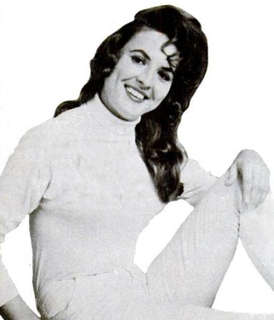
Melba Montgomery is an American country music singer. She is best known for duet hit recordings in the 1960s with country music singer George Jones and later Charlie Louvin.
"Blue Eyes Crying in the Rain" is a song written by songwriter Fred Rose. Originally performed by Roy Acuff, the song has been covered by many artists; such as Hank Williams Sr., Johnny Russell, and Charley Pride. Also the song was later recorded by Willie Nelson as part of his 1975 album Red Headed Stranger. Both the song and album would become iconic in country music history, and jump start Nelson's success as a singer and recording artist.
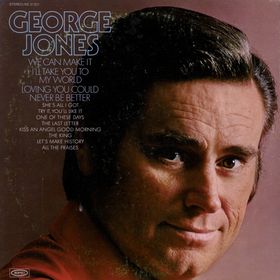
George Jones, also titled George Jones was the 1972 country music studio album released by George Jones in April 1972. The release was Jones' 46th studio album release since a debut from 16 years previous. Also as a highlight in his career, it was the first release made on Jones' new label, Epic Records.
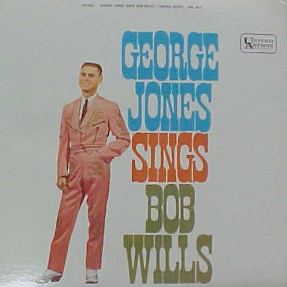
George Jones Sings Bob Wills is an album by American country music artist George Jones. It was released in 1962 on the United Artists Records.

Sings Country and Western Hits is the 1961 country music studio album released in May 1961 by George Jones. The album was Jones' tenth studio album release since his debut LP in 1956. It would be one of his last with Mercury Records, as he switched to United Artists in late 1961.

Sings from the Heart is the 1962 country music studio album released by George Jones in June 1962. The album was his eleventh studio LP release, and was his last with Mercury, after switching to United Artists in late 1961. The album's theme was listing of songs about the heart, and contains his last #1 with Mercury Records from 1961, Tender Years.
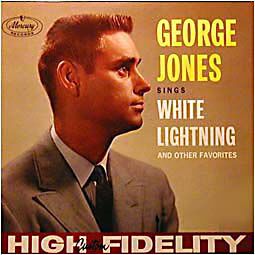
White Lightning and Other Favorites is the seventh studio album released by George Jones on May 26, 1959. Its title track "White Lightning" was a #1 Country hit in 1959.
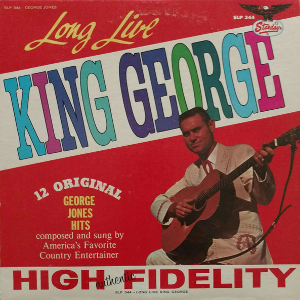
Long Live King George is a 1965 country music album released by George Jones. The album was long thought to be a studio release, however, it is a late Starday Records compilation of Jones recordings throughout the mid to late-1950's.

Grand Ole Opry's New Star is the debut studio album released by George Jones on October 1, 1956. with Starday Records. Produced by Jones' manager Pappy Daily, the album was recorded during early sessions in 1954, throughout 1955, and other sessions in 1956. It is also the first album to be released on the Starday label, a label only four years old.
"White Lightning" is a song written by the rockabilly artist J. P. Richardson, best known by his stage name, the Big Bopper. The song was recorded by American country music artist George Jones and released as a single in February 1959. On April 13, 1959, Jones' version was the first number-one single of his career. The song has since been covered by numerous artists.
"The Race Is On" is a song written by Don Rollins and made a hit on the country music charts by George Jones and on the pop and easy listening charts by the unrelated Jack Jones. George's version was the first single released from his 1965 album of the same name. Released as a single in September 1964, it peaked at number three on the Billboard Hot Country Singles chart and at number 96 on the Billboard Hot 100 in January 1965. Jack's version topped Billboard's Easy Listening chart and reached number 15 on the Hot 100 the same year. The two recordings combined to reach number 12 on the Cashbox charts, which combined all covers of the same song in one listing and thus gave George Jones his only top-40 hit. The song uses thoroughbred horse racing as the metaphor for the singer's romantic relationships.
"Then and Only Then" is a song written by Bill Anderson and recorded by the American country artist, Connie Smith, on her Connie Smith. It was produced by Bob Ferguson and released in January 1965, reaching the Top 5 on the Billboard country music chart in early 1965, becoming her second major hit. It was her follow-up single to her multi-week number one hit, "Once a Day", which was released the previous year.
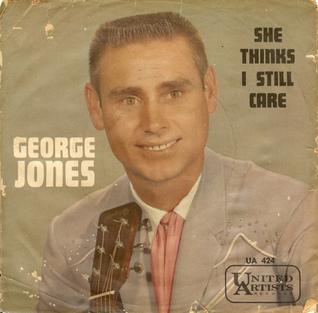
"She Thinks I Still Care" is a country song written by Dickey Lee and Steve Duffy. The song was recorded by multiple artists, including George Jones, Connie Francis, Anne Murray, Elvis Presley and Patty Loveless.
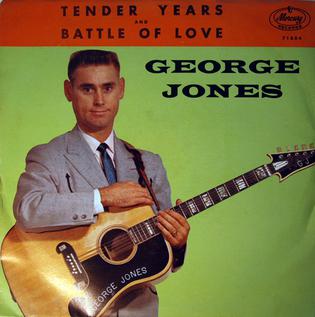
"Tender Years" is a song written by American country music artist George Jones and Darrell Edwards. It became Jones' second #1 country hit.
"Walk Through This World with Me" is a song written by Sandy Seamons and Kaye Savage and recorded by American country music artist George Jones. It was released in January 1967 as the title track of his twenty-fourth album. The single was George Jones' fifty-seventh release on the country chart and his fourth number one. "Walk Through This World With Me" stayed at number one for two weeks and spent a total of nineteen weeks on the country chart.
"Let's Invite Them Over" is a song written by Onie Wheeler, which was recorded as a duet by American country artists George Jones and Melba Montgomery. The song was released as the pair's second single in 1963.
"What's in Our Heart" is a song written by George Jones and Johnny "Country" Mathis. It was recorded and released as a B-side duet by American country artists George Jones and Melba Montgomery. It was recorded at the Columbia Recording Studio, located in Nashville, Tennessee, United States on May 23, 1963. The recording date was the second session that took place between Jones and Montgomery. Other songs included on the session were "Let's Invite Them Over", "Suppose Tonight Would Be Our Last", and "I Let You Go". The recording session included The Nashville A-Team of musicians, whom appeared on other recordings by the pair. The session was produced by Pappy Daily. "What's in Our Heart" was issued as the B-side to the pair's 1963 single "Let's Invite Them Over". The song received radio airplay and reached the twentieth position on the Billboard Magazine Hot Country Singles list. It became the duo's third major hit single together.
"Color of the Blues" is a 1958 country song written by George Jones and Lawton Williams and released by Jones on January 15, 1958.
"Don't Stop the Music" is a song written and recorded by George Jones. It was his first single release on Mercury-Starday and peaked at #10 on the country singles chart in early 1957.













